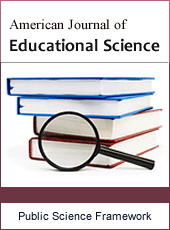American Journal of Educational Science
Articles Information
American Journal of Educational Science, Vol.4, No.4, Dec. 2018, Pub. Date: Sep. 4, 2018
Reflection in the Implementation of Intercultural Communication Skills in Speech and Language Pathology Classes in Morocco
Pages: 122-126 Views: 2268 Downloads: 1150
[01]
Mohamed Taiebine, Faculty of Health Sciences, Université Internationale de Casablanca (UIC), Casablanca, Morocco.
[02]
Abdelhakim Doukkali, Academic Affairs Vice-Presidency, Université Internationale de Casablanca (UIC), Casablanca, Morocco.
The purpose of this article is to present a reflection on the impact of intercultural learning inputs in speech and language pathology (SLP). In recent years, the SLP Cohorts within Laureate Network have learned much by treating this perspective using the concept of online classes which is a powerful experiential learning method in comparison with the traditional classroom training. In the international context of academic training of SLP, it seems that such intercultural communication is a key element that prepares students to be able to work fluently across differing cultural contexts and consequently they become more likely to succeed in demanding contemporary workplaces. When working with multicultural and multilinguistic population and minorities regardless of country, speech and language pathologists (SLPs) should consider socio-linguistic and socio-cultural factors that may impact their clinical decision making. Dismissing these influences would not be equitable nor ethical. Definitions of intercultural communication will be discussed, along with SLPs competences in this manuscript with some examples derived from the Moroccan context of clinical practice using the concept of contrastive analysis. According to Crowley theoretical framework, it’s recommended to distinguish a communication disorder from cultural difference as a part of the clinical competency. In many of these situations, a clinician’s knowledge of the client’s culture and language cannot be separated from a clinician’s cultural competence. Therefore, test scores will not distinguish a language disorder from a cultural difference.
Intercultural, Communication, Speech and Language Pathology, Morocco, Contrastive Analysis, Difference, Disorder
[01]
Boumans, L., & de Ruiter, J. J. (2002). Moroccan Arabic in the European diaspora. Language contact and language conflict phenomena in Arabic, 259-285.
[02]
Kayser, H. 1993. Hispanic cultures. In D. Battle (Ed.), Communication disorders in intercultural populations (pp. 114-157). Boston, MA: Andover Medical Publishers.
[03]
Westby, Carol., & Rouse, Geraldine. 1994. Culture in education and the instruction of language learning-disabled students. In K. G. Butler (Ed.), Cross-cultural perspectives in language assessment and intervention (pp. 155-168). Gaithersburg, MD: Aspen Publications. http://psycnet.apa.org/doi/10.1097/00011363-198509000-00005
[04]
Hall, Edward. T. 1983. The dance of life. New York: Anchor.
[05]
Halverson, C. B., & Tirmizi, S. A. (Eds.). 2008. Effective multicultural teams: Theory and practice (Vol. 3). Springer Science & Business Media.
[06]
Sue, Derald. Wing., Arredondo, Patricia., & McDavis, Roderick. J. 1992. Multicultural counseling competencies and standards: A call to the professional. Journal of Counseling and Development, 70, 477486. https://doi.org/10.1002/j.1556-6676.1992.tb01642.x
[07]
Crowley, C. J., Guest, K., & Sudler, K. (2015). Cultural competence needed to distinguish disorder from difference: Beyond Kumbaya. SIG 14 Perspectives on Communication Disorders and Sciences in Culturally and Linguistically Diverse (CLD) Populations, 22 (2), 64-76.
[08]
McGregor, K. K., Williams, D., Hearst, S., & Johnson, A. C. (1997). The use of contrastive analysis in distinguishing difference from disorder: A tutorial. American Journal of Speech-Language Pathology, 6 (3), 45-56.
[09]
Proctor, E. K., & Davis, L. E. (1994). The challenge of racial difference: Skills for clinical practice. Social Work, 39 (3), 314-323.
[10]
Khamis-Dakwar, R., & Froud, K. (2012). Aphasia, language, and culture: Arabs in the US. Aspects of Multilingual Aphasia, 8, 275–288.

ISSN Print: 2381-7127
ISSN Online: 2381-7135
Current Issue:
Vol. 6, Issue 2, June Submit a Manuscript Join Editorial Board Join Reviewer Team
ISSN Online: 2381-7135
Current Issue:
Vol. 6, Issue 2, June Submit a Manuscript Join Editorial Board Join Reviewer Team
| About This Journal |
| All Issues |
| Open Access |
| Indexing |
| Payment Information |
| Author Guidelines |
| Review Process |
| Publication Ethics |
| Editorial Board |
| Peer Reviewers |


